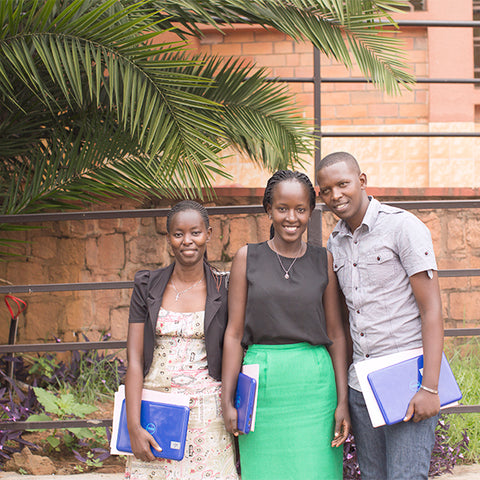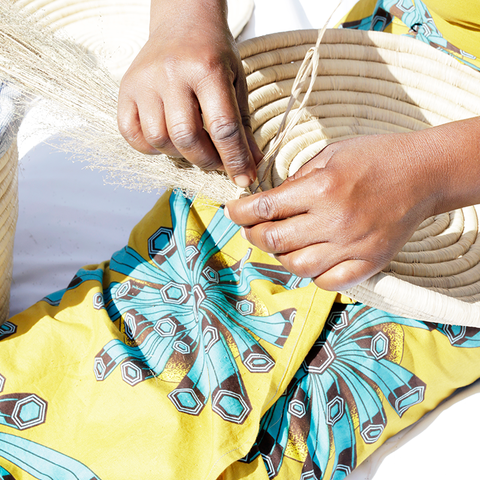In June 2016, we launched our Technology Training for the Workplace (TTW) program as part of Indego’s growing mission to address the livelihood challenges facing youth in Africa today.
In a world where only 8% of eligible Rwandans and 16% of eligible Ghanaians enroll in college, we envisioned a program in which young people would gain the technical skills and experience to not only enter the workforce, but also be prepared, confident, and successful in their careers.
Our goal was to help close the pervasive “skills mismatch” between what young Africans learn in secondary schools and universities, and the skills they need to participate in an increasingly digitized workplace. We began providing young college graduates across Rwanda and Ghana with a holistic introduction to the technical and business soft skills they would need to successfully enter the workforce and secure wage-earning jobs.

Out of 50 spots available in the first round of our TTW workshop in Rwanda, more than 400 young people applied—a statistic that highlights the incredible need for these kinds of programs in Africa where many college graduates remain persistently unemployed.
By the end of our first workshop, almost one-fourth of the class had secured a job! Students cited that the training they received in foundational computer skills and relevant software programs (like Microsoft Word, Excel, and PowerPoint), as well as in skills like resume writing, time and project management, public speaking, and effective email communication, were crucial in helping them navigate and excel in the job application process.
Nine workshops and 225+ students later, Indego’s TTW program continues to be a successful (and competitive!) program for young, aspiring entrepreneurs, accountants, NGO leaders, and social change-makers who want to put their knowledge into action and pave the way for generations to come. Our results prove the value of our model: a 63% average job placement rate upon graduation from each five-week workshop.

So, where are they now? How has Indego’s TTW program influenced their careers? We interviewed three of our former TTW students in Rwanda to find out about their job search experience, workplace life, and what exactly they’ve been up to since graduating. Read more below!
What was your life like before participating in Indego’s TTW program?
Anaise Marie Merci Iwacu, 26: I graduated from the University of Rwanda in 2016 with a Bachelors’ degree in Chemistry but my computer skills were totally weak. I held a position as a storekeeper for a while but I didn’t know how to write application letters or put together a CV so it was difficult to apply for any other jobs.
Séraphine Uwizeyimana, 24: Before participating in Indego’s TTW program, my life was very difficult to manage because I didn’t have the skills to help me look for work or compete in the employment market. I had a Bachelors’ degree in Information Technology but didn’t know how to make myself stand out as a candidate.
Théoneste Dushimimana, 26: I didn’t have a job before participating in TTW. I was struggling to find work but had a dream to become a businessman and someday have my own company. I felt like Indego Africa would help me increase my knowledge so I could achieve these things.
Why did you want to participate in TTW?
Anaise: I wanted to improve my digital and soft skills. I hoped to practice using word processing software and gain knowledge about career planning and public speaking. I wanted to become a professional businesswoman and I knew Indego Africa’s TTW program could help me achieve my goals.
Séraphine: I wanted to learn how to effectively manage my time and create relationships that matter in the workplace. Employers value success and integrity and I needed the skills to communicate these things. I especially wanted to improve my CV writing skills.
Théoneste: I wanted to participate TTW because I was interested in learning more about computer technology and gaining important communication skills that would help me plan my career. One of my specific goals was to raise my skill level in Microsoft Word and PowerPoint.
Tell us a little bit about your life since graduating from TTW.
Anaise: My life has totally changed because of what I learned in TTW. I know how to work well in team, type and organize data, and communicate confidently. Now that I’m working professionally, I really appreciate having those skills.
Séraphine: After graduation, I continued searching for a job or any additional training to help me improve my skills. I was able to get a position that is now helping me practice and implement what I learned in TTW.
Théoneste: There is an enormous difference between where I was before TTW and where I am today. I now have a full-time job and am applying the skills I learned during the program every day at work. My life has definitely changed for the better since I graduated from TTW.
What do you do for work now? What do you like most about your role?
Anaise: I am the storekeeper at a health and medical supplies company. I am the one who oversees all operations related to inventory. I open the store in the morning, help stock it, and close it in the evening.
I like managing and tracking the inventory but I what I like most of all is helping other people. The organization I work for provides medicine to the community so I feel like I can work and help my community at the same time!
Séraphine: I am a judge in the local court and sometimes do secretarial-related activities at the institution where I work. My goal was to follow my career using data in the district courts. I was attracted to this institution for that reason. Plus, it’s very organized so I am able to apply the organizational skills I learned during TTW.
I’ve had multiple opportunities to practice my digital skills, but I’ve also learned a lot from participating in registration activities at my institution. That’s what I like the most- using my skills to organize data and register organizations in my district.
Théoneste: I am a supervisor at an ICT company that develops technology products for international development practitioners. I work closely with my manager to help oversee other employees. Before working there, I was unemployed. Now I work with an organization that’s helping me apply what I learned in TTW.
I like supervising and communicating with other employees. I’ve learned a lot from working with so many people.
What was the job application process like? How did Indego’s TTW program influence your job search and/or application process if at all?
Anaise: My friend sent me an application link and I applied. I was selected to participate in the first step of the process which was a writing exam. Then I was called in for the next interview and passed another exam. After another week in the selection process, I was hired to start my job. All of that was due to the computer and soft skills I gained in TTW!
Séraphine: I submitted my CV and cover letter to apply for this job. After my initial selection, I passed an interview and was finally called in to start the job. Indego’s TTW program influenced how I found the job and now helps me during everyday work activities. For example, organizing documents, being at work on time, managing my priorities, and producing effective reports are all skills I gained from TTW.
Théoneste: I got a job application link from a former workmate who I worked with during an internship I held during school. I tried my best to apply for that job using what I had learned about applications during TTW and was selected to complete the written and interview exams. Out of the five finalists, two of us were selected to start working. TTW prepared me to write my CV, trained me in good test-taking techniques, and taught me how to communicate in an interview.
What do you think were the most important skills you learned in TTW? How have you used those skills to advance your professional career?
Anaise: For me, the soft skills were the most important things I learned in TTW. Now I am able to effectively manage my time while being creative and innovative at work. Also, when I started my job, there was no modern data storage system. They used to calculate everything in their heads or on paper. I was able to use the skills I learned from TTW to create excel documents that help track the store’s inventory.
Séraphine: Digital skills were the most important skills I learned. For example, before TTW I was really poor at typing and my computer skills were weak. Since TTW, I have been able to successfully work at an institution that requires having knowledge of computer programs like Microsoft Excel and Microsoft Word. Without TTW, I wouldn’t have those skills and I wouldn’t have been able to get this job.
Théoneste: The most important things I learned during TTW were how to conduct yourself during an interview and how to write a winning CV. These skills enabled me to advance my career. Now I know how to effectively manage people and apply valuable computer and soft skills to my everyday life.
How has TTW helped you achieve your goals? What kinds of opportunities has it provided you with?
Anaise: TTW helped me become good at organizing everything. I’ve achieved personal and professional goals by planning and using organizing tools in my daily work. I also think that young people have seen that it is not beneficial to wait for someone to create an occupation for you. You have to put yourself out there and try to start your own career. That mindset has been helpful to have everywhere in my life.
Séraphine: I am happy and confident because I’ve become competitive in the employment market. I learned a lot from TTW in terms of setting goals and prioritizing tasks. Today, I can successfully complete any computer exam. These are opportunities I couldn’t achieve or even access without TTW!
Théoneste: My immediate goal was to find a job and TTW helped me achieve that. Learning how to work in a team also opened up new opportunities for me. I now know how to network with my colleagues and use a computer to set my goals and organize first.
What are your plans for the future?
Anaise: I want to continue working in the pharmaceutical industry and become even more familiar with the industrial structure. Eventually, I hope to start my own business which will produce health products for the community.
Séraphine: I want to open my own business and am currently thinking of looking for an additional job to help me raise some funds to get that idea off the ground.
Théoneste: My plan is to start my own business. I am grateful for program’s like TTW that helped instill in me the skills I need to start working towards this goal. I hope we can have more trainings like that to help Rwandan youth in the future.



